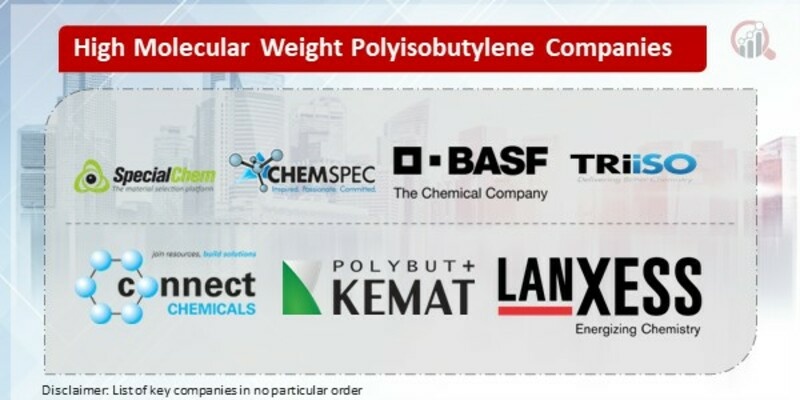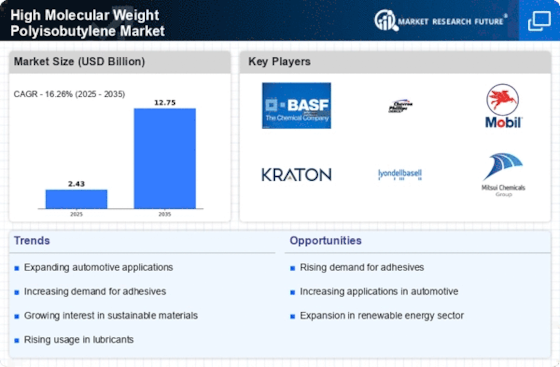Top Industry Leaders in the High Molecular Weight Polyisobutylene Market

The high molecular weight polyisobutylene (HMW PIB) market, is versatile polymer, prized for its high viscosity, elasticity, and chemical resistance, finds applications in diverse sectors like lubricants, adhesives, sealants, and even food packaging. Yet, beneath this seemingly stable surface lies a dynamic competitive landscape where established players and ambitious newcomers grapple for market share.
Strategic Maneuvers Shaping the Market:
-
Industry Leaders: ExxonMobil Chemical, BASF, Lubrizol, and Infineum hold significant market share through established production capacities, diverse product portfolios, and global reach. Their strategies focus on expanding production capacities, R&D for advanced HMW PIB derivatives, and strategic acquisitions to strengthen distribution networks. -
Regional Champions: Regional players like China Petroleum & Chemical Corporation (Sinopec) and Formosa Plastics in Asia play a vital role in their respective markets. They compete on price, cater to regional preferences, and build strong local partnerships. -
Specialty Niche Players: Smaller companies like Nippon A&L and Entek specialize in high-performance HMW PIB grades for specific applications like fuel additives or medical devices. They leverage innovation and cater to specific customer needs, often commanding premium prices.
Factors Dictating Market Share:
-
Production Scale and Efficiency: Large-scale production facilities and optimized manufacturing processes are crucial for cost-effective HMW PIB production, offering a competitive edge. -
Product Innovation and Diversification: Offering a diverse range of HMW PIB grades with tailored properties for specific applications like high-temperature lubricants or food-grade adhesives attracts a wider customer base and increases market share. Continuous R&D is key to stay ahead of the curve. -
Global Reach and Distribution Network: A strong global presence with efficient logistics and distribution networks ensures timely delivery and market reach, particularly in geographically diverse markets. -
Sustainability and Regulatory Compliance: Adhering to environmental regulations and developing eco-friendly HMW PIB solutions like bio-based or recyclable grades is becoming increasingly important for market access and customer loyalty. -
Technical Support and Customer Service: Excellent technical support and building strong customer relationships foster trust and repeat business, leading to market share consolidation.
Key Players:
-
CHEMSPEC, LTD.
-
BASF SE
-
TRiiSO
-
OJSC "Efremov Synthetic Rubber Enterprise"
-
Naxant
-
Connect Chemicals
-
KEMAT Polybutenes
-
Lanxess AG
-
Daelim
-
FERRO-PLAST S.r.l.
-
SpecialChem
Recent Developments :
-
September 2023: Sinopec partners with a leading electric vehicle manufacturer to develop high-performance lubricants using HMW PIB, targeting the growing EV market. -
October 2023: Lubrizol acquires a specialty chemical company with expertise in high-purity HMW PIB for pharmaceutical applications, expanding its reach into new markets. -
November 2023: Nippon A&L develops a novel, ultra-high-viscosity HMW PIB grade for extreme pressure lubricants, attracting interest from the aerospace industry. -
December 2023: Infineum and BASF announce a joint venture to develop and market next-generation HMW PIB additives for fuel-efficient and environmentally friendly lubricants.










